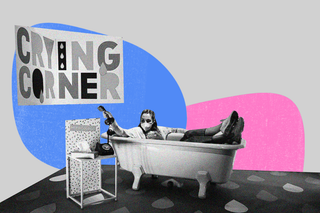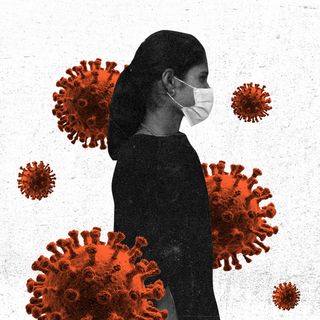
Spain Has Set Up a ‘Crying Room’ to Dispel Stigma Around Mental Health
The space features signs like “Enter and cry” or “I too have anxiety,” and tells visitors it’s okay to ask for help.

Spain has a “crying room” now — bang in the middle of its capital city, Madrid.
Called La Lloreria, the idea behind constructing it is to dispel the stigma around attending to one’s mental health — be it in the form of crying, taking some time out to gather one’s wits, or simply seeking help.
Crying Room in Madrid, Spain, aims to remove the stigma in society attached to mental health and seeking help https://t.co/O0zCTW5Te7 pic.twitter.com/SVfadlYNfo
The room, housed in a central part of the Spanish capital, has glowing neon pink signs saying: “Enter and cry,” and “I too have anxiety.” The expression of solidarity in the latter, perhaps, will help people feel less alone in their struggles with mental health.
The room has phones in one corner. Alongside, there’s a list of people one can call if they need to talk to someone. It includes contact details of mental health professionals.
Reportedly, in Spain, 3,671 people died by suicide in 2019 alone, and at present, one in 10 adolescents has been diagnosed with a mental health condition. The glammed-up “crying room” — described as “Instagrammable” by Spain’s local publications — is a way to draw attention to the problem.
“It is a really excellent idea to visualize the mental health issue. It is stigmatized to cry in Spain as in many other countries,” Jon Nelssom, a Swedish student living in Madrid, told Reuters.
In addition, to mitigate the impact of mental health on the Spanish population, the country’s government is reported to have launched a $116 million mental healthcare drive, including services such as a 24-hour suicide helpline.
“It is not a taboo, it is a public health problem that we must talk about, make visible, and act accordingly,” Pedro Sanchez, the Spanish Prime Minister, told reporters.
Related on The Swaddle:
We Asked Experts Why It Is So Hard to Get Insurance Coverage for Mental Health in India
But as Nelssom pointed out, the stigma around mental health isn’t unique to Spain alone. Mental distress is believed to be the critical reason behind one student dying by suicide every hour in India. A WHO report states that one in every 20 Indians suffers from depression. Simultaneously, 38 million people in the country are suffering from anxiety disorders. In fact, according to the WHO, India leads the list of countries most affected by anxiety, schizophrenia, and bipolar disorder.
In 2017, President Ram Nath Kovind had said, “India does not simply have a mental health challenge… it is facing a possible mental health epidemic.” The global health crisis that unfolded through 2020 and 2021 has only made things worse.
To alleviate the mental health toll of the pandemic on the Indian population, the country’s Social Justice and Empowerment Ministry had launched a multi-lingual, 24/7, toll-free mental health rehabilitation service in September last year — called the KIRAN helpline. “Due to the stigma around it, mental health patients do not feel comfortable seeking help. Keeping this in mind, the identities of people calling the helpline will be kept anonymous,” Probodh Seth, joint secretary at Department of Empowerment of Persons with Disabilities that developed the helpline, told The Print.
Interestingly, despite the stigma around mental health — exacerbated by toxic ideals of masculinity that put forth the view that mental health issues are a “sign of weakness” — the majority of the callers on the helpline turned out to be men.
Either conversations around mental health in the wake of the pandemic have reduced the stigma, or people’s mental health has worsened to a point where many choose to combat the stigma and do what’s best for themselves. We may never know which one it is, but it does seem like a good time to ramp up initiatives to sensitize more and more people about mental health. Perhaps, Spain can be one of our inspirations in this regard?
Having said that, one does worry whether tucking away into a room to cry might make mental health something one must care for in a hush-hush way. But given the amount of publicity surrounding the very-Instagrammable La Lloreria, perhaps, I’m worrying in vain. Moreover, as a colleague pointed out this morning, wouldn’t it be nice to have some quiet space available in public areas to take a hot minute to ourselves and cry our hearts out every once in a while when things get overwhelming?
Okay, I’m crying now — happy tears at the prospect of “crying rooms” in public places.
Call the toll-free KIRAN helpline at 1800-599-0019 and the Union Health Ministry Helpline at #080-46110007.
Devrupa Rakshit is an Associate Editor at The Swaddle. She is a lawyer by education, a poet by accident, a painter by shaukh, and autistic by birth. You can find her on Instagram @devruparakshit.
Related


A New Test Can Analyze Vaginal Microbiomes To Track Pregnancy Risks
